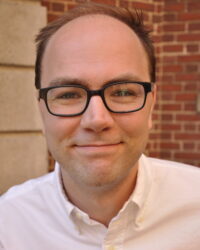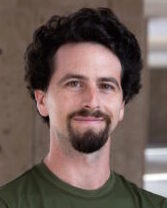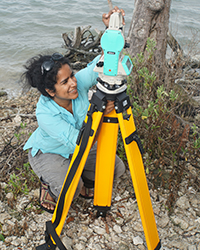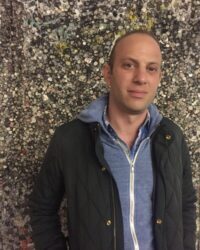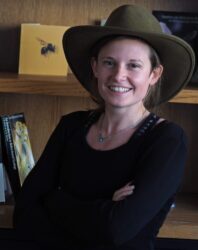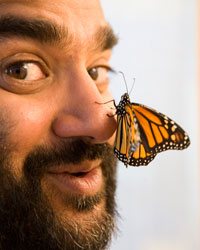 |
Anurag Agrawal
Cornell University |
This project seeks to advance the science of goal-directed phenomena in one of the best studied, yet least understood migratory animals. The goal is to open the door on how agency can change inter-generationally, but in a highly repeatable way, and may be dually controlled by repeated bouts of evolution and extra-genetic inheritance. The legendary migration of monarch butterflies could well unlock some of the long-standing mysteries of purpose in biological systems. |
 |
J. Arvid Ågren
Harvard University |
The paradox of the organism is the fact that despite the opportunity for agents like selfish genetic elements and cancer cells to erode the organism from the inside, they usually do not, and organisms appear as closely integrated purposive wholes. This project will use theoretical tools from social evolution theory to examine this paradox and derive solution for how and when the unity of purpose breaks down and it is more appropriate to speak of the organism being fragmented into multiple competing agents, rather than one unified one. |
 |
Nicole Creanza
Vanderbilt University |
As scientists strive to understand the genetic underpinnings of physical and behavioral characteristics, the importance of non-genetic transmission is also becoming apparent. There are several key examples: (1) experience-driven epigenetic modifications to DNA can dramatically alter the way genes are expressed, (2) the gut microbiome changes with diet and stress and can induce neurological shifts with wide-ranging effects on behavior and learning, and (3) traits transmitted via culture and learning can influence survival and reproduction. I propose that these non-genetic factors are not independent—they interact and should be studied together, launching the broad interdisciplinary field of ‘extra-genetic evolution.’ Using songbirds as a model system, we are studying how early-life stress affects epigenetic modifications, song-learning processes, and the gut microbiome, and how these complex processes interact. |
 |
Nick Hollon
Salk Institute for Biological Studies |
Dr. Nick G. Hollon studies the brain circuitry underlying goal-directed behavior and how we learn to associate our actions with their consequences. Focusing on dopamine, a brain chemical critically involved in voluntary movement and reward learning, he has found that an animal’s own goal-directed action suppresses the dopamine response to the resulting reward outcome, and he is investigating upstream brain circuitry regulating these dopamine dynamics in mice. Similar suppression of neural responses to the consequences of self-generated actions has been observed in multiple sensory systems throughout the brain, and this widespread phenomenon of action-related suppression may contribute to one’s sense of agency, the experience of controlling your actions and their consequences. To further investigate this possible link, he proposes to adapt behavioral procedures for time interval judgments to examine whether mice also experience shortening of perceived time intervals between their actions and consequent outcomes, as widely reported in studies of agency in humans. |
 |
Ambika Kamath
Miller Institute for Basic Research in Science, University of California Berkeley |
I am interested in a mode of purposive agential thinking in behavioral ecology that sheds the constraints of a rational agent whose sole goal is maximizing individual fitness. Organisms’ behaviors represent a complex and dynamic integration across ecological and social conditions that vary both within an organism’s lifetime and across its evolutionary history due to various adaptive and non-adaptive processes, making it biologically sensical to consider organisms as having multiple goals. To this end, I will unite ideas from philosophy, psychology, evolutionary biology, and more to explore the conceptual and empirical ramifications of envisioning organisms as dialectical agents that work towards multiple proximate and ultimate goals. |
 |
Eric Mandelbaum
CUNY (Graduate Center & Baruch College) |
How do beliefs cause behavior? A cherished explanation suggests that behavior is the consequence of decision-theoretic calculations defined over belief/desire pairs. A different idea is that the mind has a psychological immune system designed to allay psychological discomfort. From this viewpoint, grand life pursuits—such as finding spirituality as a way to ease the mind—begin to look like the proper outputs of a well-functioning mind. |
 |
Felicity Muth
University of Texas at Austin |
In the field of cognition, an animal with goal-directed behavior can be thought of as having: 1) an internal representation of a causal relationship between an action and its consequence and 2) a representation of the current value of the outcome. While goal-directed behavior has been described in vertebrates, it has not been tested in an invertebrate. I propose to study goal-directed behavior in bees, in order to understand the cognitive underpinnings and shed light on how phylogenetically widespread goal-directed behavior may be. |

